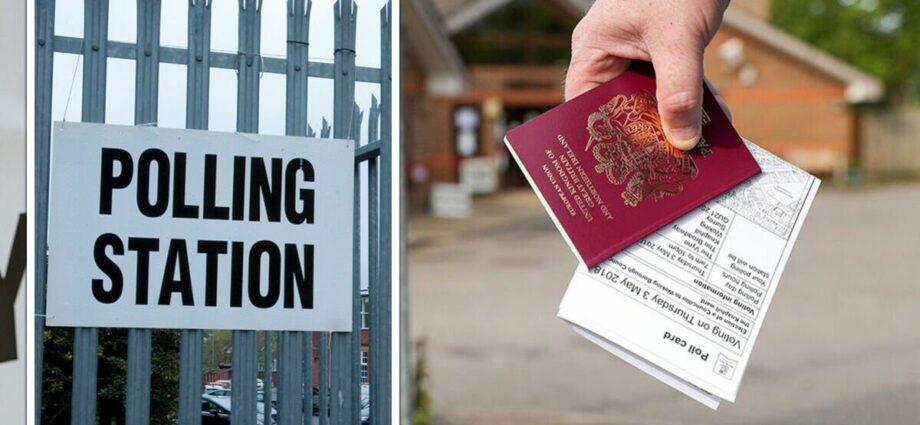Ruth Davidson swears about voter ID proposals in May
We use your sign-up to provide content in ways you’ve consented to and to improve our understanding of you. This may include adverts from us and 3rd parties based on our understanding. You can unsubscribe at any time. More info
New Government rules will require voters in Great Britain to show photographic identification before being given their ballot paper at polling stations. The reforms are set to be introduced ahead of the local elections in England next May. A move which has been backed by 88 percent of Express.co.uk readers in a new poll.
It will be a requirement for all general election, as well as local ballots in England, and Police and Crime Commissioner elections in both England and Wales. Identification is already a requirement in Northern Ireland.
The change is being implemented under the Elections Act which became law in April and is a move to help prevent voter fraud. However, the Electoral Commission reports “low levels” with just nine convictions since 2017.
Prime Minister Rishi Sunak’s official spokesperson said: “We believe it’s right to ensure there are protections in place against potential voter fraud”.
There are also practical concerns about the implementation, with The Electoral Commission’s director of electoral administration, Ailsa Irvine, told the Financial Times that changes “must be delivered in a way which is accessible, secure and workable”.

In response, Express.co.uk ran a poll from midday on Tuesday, December 13, to 10am on Thursday, December 15, asking readers: “Do you support the introduction of photo ID at polling stations?”
Overall, 9,016 people responded with the vast majority, 88 percent (7,959 people) answered “yes” in favour of photographic identification.
Whereas, 11 percent of readers (1,013 people) said “no” it should not be introduced and a further 44 people said they did not know.
In the hundreds of comments left below the accompanying article readers took part in a lively debate.
Many readers argued in support of photographic ID cards being made mandatory for voters, with username OneGuySomewhere writing: “Yes, do it now to stop fraudulent voting.”
Username MissingEUAlready2 said: “There is not one single good reason to disagree. Voting should be protected against fraud.”
Another, username dyslexic accountant, said: “Something needs to be put in place to counter the voting fraud.”
Username Nosirrah wrote: “Yes! Surely our democracy should be secure and worth protecting!”
DON’T MISS:
Boris Johnson and Priti Patel back Rwanda flights bid [UPDATE]
Northern Ireland Protocol Bill delay slammed as ‘weak’ – YOUR VERDICT [INSIGHT]
Richard Branson calls for Britain to strike Swiss-style deal with EU [LATEST]

While username Alanshrewsbury added that photo ID is “the only way to cut out fraud in the voting.”
And username Pockets 051 said: “It’s standard routine in Northern Ireland and is not an issue to anyone so why should the rest of the UK find it so difficult? Your vote so protect it.”
Others argued that this should be taken further with national identity cards being issued. Username Moonraker-lad said: “I support ID cards for all in the UK.”
Likewise, username DeathtotheEU added: “Yes followed by a national identity card.”

However, others commented that ID cards were not the way forward and that the postal vote system should be reformed, like username turqoisenoise said: “Voter fraud is extraordinarily low. Photo ID is a solution in search of the problem. It’s just an attempt at US-style voter suppression.”
Username GB39 said: “Photo ID will help solve a small problem. The much bigger problem lies with the manipulation of Postal Voting which is wide open to abuse.”
And username DeliberatelyLeftBlank wrote: “It is the postal vote that is most abused. Without the privacy of the voting booth, voters can be pressured or bought.”
Username LindsayH added: “It’s unlikely to make much difference until postal votes are banned to prevent mass fraud.”
Source: Read Full Article
-
U.S. Sanctions North Korean Firms For Generating Revenue For Ballistic Missile Programs
-
Congress opens "forever wars" debate with repeal of Iraq authorization
-
Trump Campaign Says It Has Raised $6.6 Million Since Indictment
-
Rishi blasted for being blind to China threat and only realising danger late
-
EU leaders set for big bust up as energy crisis crisis cripples bloc

